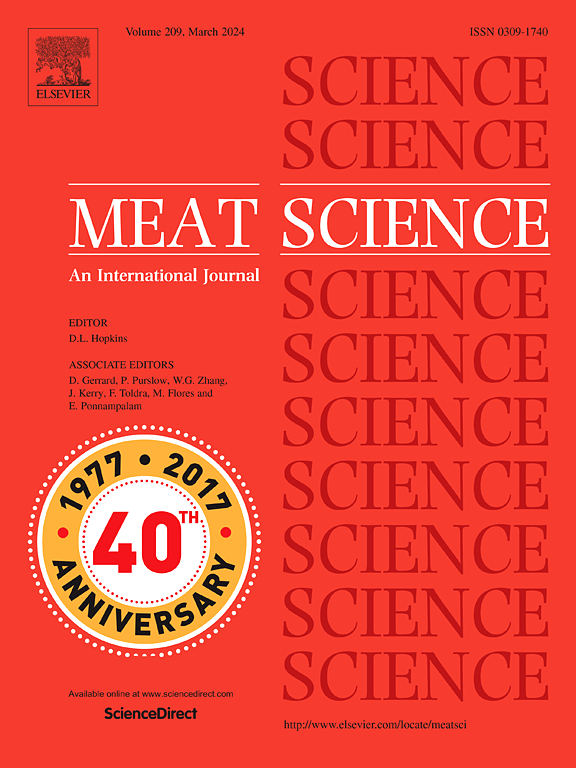Dry-aged beef quality with the addition of Mucor flavus – Sensory, chemosensory and fatty acid analysis
IF 7.1
1区 农林科学
Q1 Agricultural and Biological Sciences
引用次数: 0
Abstract
Dry-aged beef is a premium product known for its unique taste and aroma. These characteristics are thought to partially depend on the composition of the microorganisms present on the meat surface during ageing. Recently several attempts to standardise this process were made. This study aimed to assess the effect of a fungal biostarter application on the profile of volatile compounds, fatty acid composition and sensory quality of dry-aged beef. The Longissimus muscle used in the experiment originated from 20 crossbred (10 heifers and 10 steers) animals from the crossing of Holstein-Friesian cows with beef breed bulls. A fungal biostarter composed of Mucor flavus strain KKP2092p was used for meat inoculation. Half of the material was aged without the use of a biostarter (Control samples). The dry-ageing of the meat was performed at a temperature of 1.5 °C with approximately 80–90 % relative humidity for 28 days. The use of Mucor flavus KKP2092p improved meat quality attributes (aroma liking, flavour and overall liking) as a result of the formation of specific volatile compounds. The profile of volatile compounds in the meat aged with Mucor flavus and control variants was differentiated. This study also indicated that Mucor flavus biostarter had an impact on the specific fatty acid composition. An insignificant effect of Mucor flavus on lipid oxidation expressed as mg/kg of malonaldehyde was also observed.
添加黄粘菌的干制牛肉质量--感官、化学感官和脂肪酸分析。
干煸牛肉是一种优质产品,以其独特的口感和香味而闻名。人们认为这些特点部分取决于陈化过程中肉表面微生物的组成。最近,人们尝试对这一过程进行标准化。本研究旨在评估应用真菌生物促进剂对干陈牛肉的挥发性化合物、脂肪酸组成和感官质量的影响。实验中使用的长腱肌(Longissimus muscle)来自 20 头荷斯坦-弗里斯兰奶牛与肉用品种公牛杂交的杂交动物(10 头母牛和 10 头公牛)。肉类接种使用了由黄曲霉菌株 KKP2092p 组成的真菌生物培养基。一半的材料在不使用生物诱导剂的情况下进行老化(对照样本)。肉的干老化在温度为 1.5 °C、相对湿度约为 80-90 % 的条件下进行,持续 28 天。由于形成了特定的挥发性化合物,使用黄曲霉 KKP2092p 改善了肉的质量属性(香味、风味和总体口味)。用黄曲霉菌和对照变体陈化的肉中的挥发性化合物的特征有所区别。这项研究还表明,黄曲霉菌对特定脂肪酸组成有影响。此外,还观察到黄曲霉对脂肪氧化(以毫克/千克丙二醛表示)的影响微乎其微。
本文章由计算机程序翻译,如有差异,请以英文原文为准。
求助全文
约1分钟内获得全文
求助全文
来源期刊

Meat Science
工程技术-食品科技
CiteScore
12.60
自引率
9.90%
发文量
282
审稿时长
60 days
期刊介绍:
The aim of Meat Science is to serve as a suitable platform for the dissemination of interdisciplinary and international knowledge on all factors influencing the properties of meat. While the journal primarily focuses on the flesh of mammals, contributions related to poultry will be considered if they enhance the overall understanding of the relationship between muscle nature and meat quality post mortem. Additionally, papers on large birds (e.g., emus, ostriches) as well as wild-captured mammals and crocodiles will be welcomed.
 求助内容:
求助内容: 应助结果提醒方式:
应助结果提醒方式:


